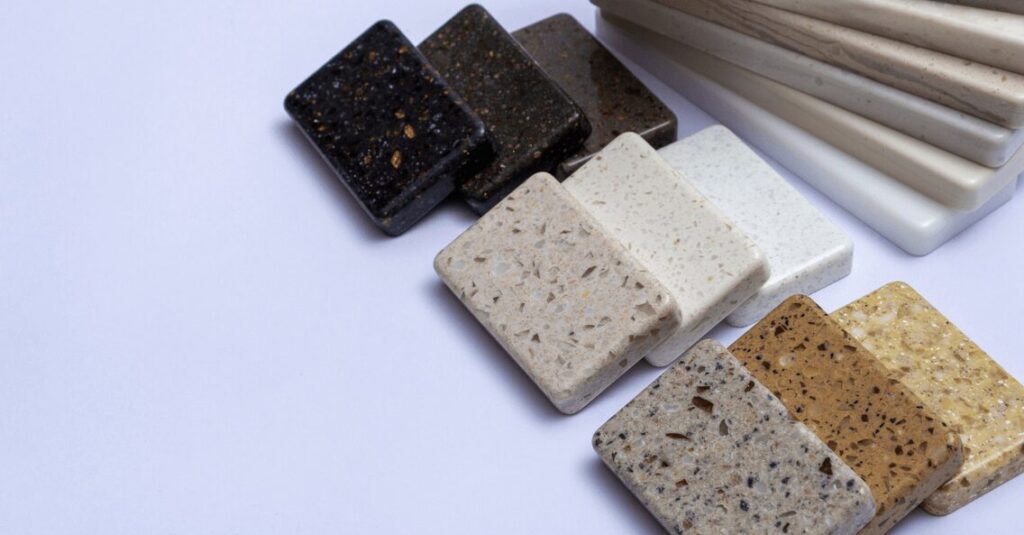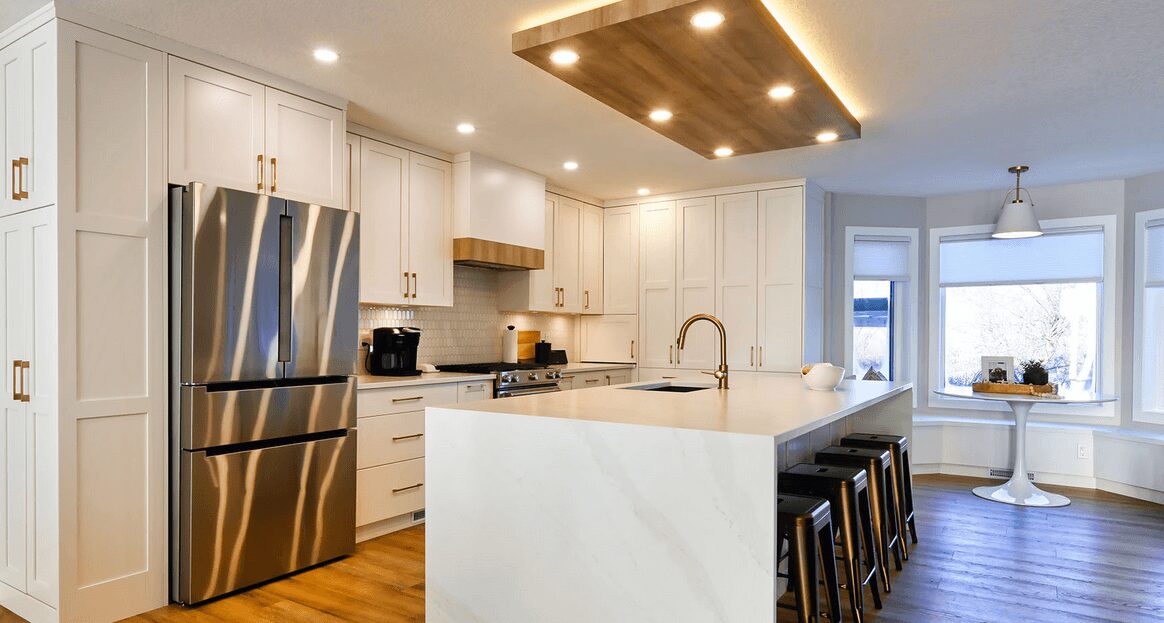Choosing the right countertop is more than a mere step in designing or renovating a kitchen; it’s a crucial decision that significantly impacts both the functionality and aesthetics of what is often considered the heart of the home. The kitchen countertop is not just a surface for preparing meals; it’s a central hub for family gatherings and a place for sharing meals and creating memories. Furthermore, selecting the perfect countertop can transform your kitchen’s look and feel, reflecting your style while enhancing the kitchen’s usability. Whether envisioning a sleek and modern design or aiming for a warm and rustic vibe, your countertop’s choice of material, colour, and finish plays a pivotal role. This comprehensive guide will walk you through the essential considerations to help you select a countertop that meets your aesthetic preferences and accommodates your cooking habits, lifestyle, and budget.
Assessing Your Kitchen Needs
Consider Your Kitchen’s Traffic and Usage
Understanding the level of activity your kitchen endures is crucial when selecting the suitable countertop material. Kitchens that experience high traffic and frequent use require surfaces that can withstand constant wear and tear without compromising aesthetics. Materials like granite, quartz, and hardened surfaces offer durability and resistance to scratches, stains, and heat, making them ideal for families that love to cook and entertain. Selecting a countertop that matches your kitchen’s activity level ensures longevity and maintains your space’s beauty and functionality.
Evaluate Your Space
Measuring your kitchen space accurately is fundamental before choosing a countertop. This ensures a perfect fit and helps plan an adequate workspace for a functional kitchen. Consider the layout and size of your kitchen, including areas where you plan to install the countertop. Think about your cooking habits and the need for space when preparing meals. Work with a professional to envision your kitchen’s potential, ensuring sufficient counter space without overwhelming the area. Additionally, factors in integrating appliances and sinks affect the overall countertop design and installation process.
Establishing a Budget
Countertop materials come in a broad range of prices, influenced by the type of material, complexity of the design, and installation costs. Setting a budget early on can guide you in narrowing down your options without compromising quality. Laminate countertops offer an economical choice, with prices on the lower end, providing a wide range of colours and designs. Mid-range options like solid surfaces and some types of natural stone offer a balance between cost and durability. High-end materials like marble, granite, and quartz come with a higher price tag but provide unmatched elegance and resilience. Understanding what each price point offers can help you make an informed decision that aligns with your financial and aesthetic requirements.
Different Types of Countertop Materials

Natural Stone Options (Granite, Marble, Quartzite)
Natural stone countertops, including granite, marble, and quartzite, offer timeless beauty and unique characteristics. Granite is highly appreciated for its durability and a wide variety of colours and patterns. It stands well against heat, scratches, and stains with proper sealing. Marble, known for its luxurious veining and brightness, adds a touch of elegance to any kitchen. However, it requires more maintenance to prevent stains and scratches. Quartzite (not to be confused with quartz) is another durable and visually appealing option, resembling marble but with higher resistance to wear and tear. These materials need regular sealing to maintain their beauty and functionality.
Quartz
Quartz countertops are engineered from quartz crystals bonded with resin, resulting in a highly durable and low-maintenance surface. The manufacturing process allows for a wide variety of colours and patterns that mimic the appearance of natural stones. Quartz is non-porous, making it resistant to stains, scratches, and bacteria, which makes it ideal for busy kitchens. The material’s durability and ease of maintenance (no sealing required) make it a popular choice for homeowners seeking beauty and functionality.
Silestone
Silestone is a brand of engineered stone made from 90% natural quartz, making it one of the most durable countertops on the market. This unique composition contributes to its high resistance against scratches and stains, providing an ideal surface for kitchen areas that see a lot of use. Silestone is available in a wide range of colours and patterns, which includes options that mimic the look of granite, marble, and other natural stones. One of the key advantages of Silestone is its non-porous nature, which eliminates the need for sealing and makes it easy to clean. Additionally, Silestone countertops are highly resistant to acid, making them a practical choice for households that enjoy cooking frequently with citrus fruits and vinegar-based recipes.
Solid Surface Materials
Solid surface materials like Corian offer a seamless look and can be custom-fitted to any kitchen design, ensuring an uninterrupted counter space. These materials come in various colours and patterns and can mimic the appearance of natural stone, wood, and other textures. Solid surfaces are non-porous, making them resistant to stains and easy to clean. Though susceptible to scratches and heat damage, these marks can be sanded out, making repair relatively straightforward.
Laminates
Laminate countertops are made from layers of plastic bonded to particleboard or kraft paper, creating a durable surface. This option is significantly more affordable than natural stone or engineered materials and offers a wide range of colours, patterns, and finishes—including those that mimic wood, stone, and other high-end materials. Laminates are easy to clean and maintain, though they can be prone to scratches, chips, and heat damage over time.
Butcher Block
Butcher block countertops add warmth and natural beauty to a kitchen, making them suitable for rustic and farmhouse design themes. Made from pieces of wood glued together into a thick slab, butcher block offers a durable and functional work surface. Regular maintenance, such as oiling, is required to prevent drying and cracking. While susceptible to scratches and cuts, these can add to the patinated charm or be sanded down for a refreshed appearance. Proper care, including sealing, can make butcher block a long-lasting and hygienic option for prep and dining areas.
Overview
- Durability: Materials like quartz and granite top the chart for their resistance to heat, scratches, and daily wear and tear, making them ideal for high-traffic kitchens. Quartzite offers similar durability with a more natural look, whereas marble, although beautiful, is more prone to damage.
- Cost: Laminate countertops are the most budget-friendly option, with solid surface and butcher blocks falling in the moderate range. Natural stones, such as granite, quartzite, marble, and engineered quartz, represent a higher investment.
- Maintenance: Quartz stands out for its low maintenance, as it doesn’t require sealing. Solid surfaces and laminates also offer ease of care, although they are susceptible to damage that might need repair. Natural stones require more attention, with regular sealing and careful use to avoid stains and scratches.
- Style Impact: Marble and quartz offer significant style impacts, brightening spaces and mimicking high-end looks. Natural wood butcher blocks bring warmth to kitchens, whereas laminates and solid surfaces provide versatility in design at a lower cost, enabling personal style without breaking the bank.
Maintenance and Care
Maintaining your countertops keeps them looking their best and extends their lifespan, making your investment worthwhile. Here’s how to ensure they remain in top condition through daily maintenance and long-term care.
Daily Maintenance Tips
Regular upkeep is key to preserving the beauty and functionality of your countertops, regardless of material.
- Wipe Spills Immediately: It is crucial to clean up spills as soon as they happen to avoid stains, especially on porous surfaces like marble and granite.
- Use Mild Cleaners: Harsh chemicals can damage countertop surfaces. Opt for gentle cleaning solutions and avoid abrasive sponges that could scratch the surface.
- Hot Pads and Cutting Boards Are Your Friends: Prevent heat damage and scratches using hot pads under pots, pans, and cutting boards for all chopping activities.
- Daily Wiping: A simple routine of wiping your countertops with warm, soapy water can keep them looking fresh and prevent the buildup of bacteria and stains.
Long-Term Care
Even with diligent daily maintenance, your countertops will likely experience some wear and tear over time. Here’s how to address common issues:
- Scratches and Nicks: You can often repair minor scratches and nicks with light sanding for solid surfaces and laminate countertops. However, with natural stone, it’s best to consult a professional to buff out any damage.
- Stains: Baking soda and water make a potent cleaning paste for stained natural stone countertops. Apply the paste to the stain, cover with plastic wrap, and leave overnight before washing off. Engineered stones often just require a vigorous wipe with a recommended cleaner.
- Sealing Natural Stone: Materials like granite and marble need regular sealing to keep them resistant to stains and damage. Depending on the stone, this might be required once a year or every few years; consult a professional for the best advice for your countertop.
- Deep Cleaning: Occasionally, a more thorough cleaning might be necessary. Mixing warm water and dish soap will do the trick for most countertop materials. For deeper stains or to disinfect, use a solution of water and white vinegar, but check first, as vinegar can etch natural stones.
By adhering to these maintenance and care tips, you can enjoy durable, beautiful countertops that last years.
Design Considerations
Matching Countertops with Kitchen Cabinets and Flooring
Choosing the right colours and materials for your countertops that complement your kitchen cabinets and flooring is essential for creating a harmonious and appealing aesthetic. Consider using a colour wheel to find complementary or analogous colours that create a striking contrast or a seamless blend with your existing elements. For a balanced look, pair bold cabinet colours with more neutral countertops and flooring shades, or vice versa. Additionally, consider the texture and pattern of the materials. For instance, a simple, solid-coloured countertop can elegantly offset highly patterned floor tiles or ornate cabinetry. Similarly, a natural stone countertop with unique veining can add interest to a kitchen with otherwise minimalist design elements.
Choosing the Right Color and Texture for Your Aesthetic
Aligning your countertop material choices with your kitchen’s design theme requires careful consideration of colour and texture. For modern kitchens, materials like polished quartz or concrete in sleek, monochromatic colours can enhance the space’s minimalistic aesthetic. Traditional kitchens may benefit from the warm hues and classic elegance of granite or marble countertops. For those seeking a rustic vibe, butcher block countertops or textured natural stones like quartzite can add the desired earthy and rugged feel. It’s important to touch and see samples of the materials in person to understand how their colour and texture will interact with the light and space of your kitchen, ensuring they contribute positively to your overall design theme.
Installation Considerations
Choosing the right countertop involves selecting the material and ensuring its proper installation. Entrusting this task to professional installers is crucial for several reasons. First, the complexity and weight of materials like granite, quartz, and even solid surfaces require precise handling and expertise to avoid damage during installation. Professional teams have the tools and experience to accurately cut, fit, and finish countertops, ensuring a seamless fit within your kitchen layout.
Additionally, professionals can identify and address potential issues that may need to be apparent to the homeowner, such as additional support for heavier stone countertops or adjustments to accommodate kitchen appliances and fixtures. Hiring a professional installer guarantees that the job is done right the first time, preventing costly mistakes and ensuring the longevity and aesthetic appeal of your new countertops.
Conclusion
In our guide, we’ve covered key aspects of choosing and caring for kitchen countertops. We emphasized daily upkeep, long-term maintenance, design choices, and the importance of professional installation. Key points include cleaning spills immediately to avoid stains, using gentle cleaners, and protecting surfaces with hot pads and cutting boards. Repair strategies and deep cleaning can address wear and tear.
Design tips include matching your countertops with cabinets and flooring to create a cohesive look. Selecting the right colour and texture is crucial for setting your kitchen’s mood, whether modern, traditional, or rustic.
The expertise of professional installers is vital for precise measurement, cutting, and installation, ensuring your countertops last and look great. Ultimately, your countertop choice should match your style, needs, and budget. These factors will help make your kitchen countertops functional and a beautiful part of your home for years.
Ready to transform your kitchen with the perfect countertop? Speak to us at MOD Kitchens! Use our Contact Form to get in touch, or visit our showroom in Fort Saskatchewan, Alberta, to explore various materials and styles.

